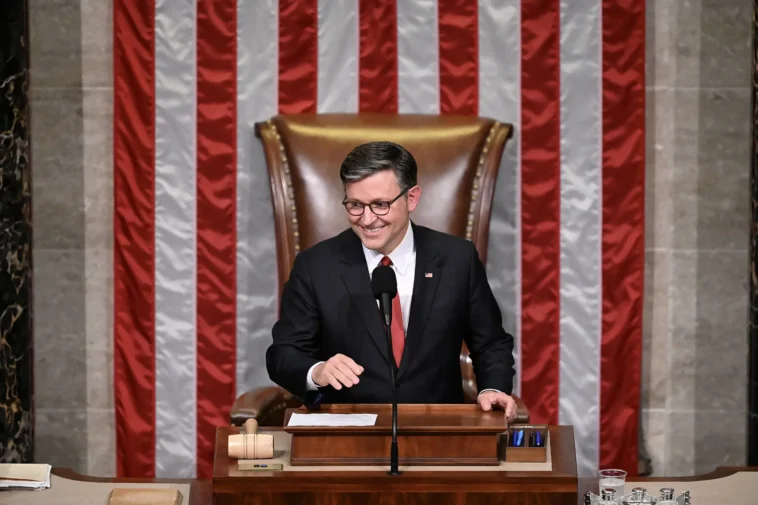On the 4th of July, former President Trump brought into effect a policy and tax bill that had managed to sway the U.S. House of Representatives in a vote of 218-214 the day before. The bill, an embodiment of Trump’s internal policies, signals a sharp decline in America’s already fragile social protection systems, along with a significant step back from our only federal defense against climate change. Not a single Democrat lent their support to this bill, with just two Republicans, notably, in opposition. The well-known non-profit Public Citizen’s co-president, Robert Weissman, expressed his concern, saying this bill propels us closer to renewing the harm caused by neglecting climate change, and additionally, leaving behind the concept of renewable energy, which plays a crucial role in combating disastrous climate influences.
The ‘Big Beautiful Bill’, as it has been labeled, received the go-ahead from both chambers of Congress, and now merely awaited Trump’s approval to be formally recognized as law. The signing occurred on the 4th of July, during an evening ceremony hosted by the White House. A notable victory for Republicans, embedded in this bill, is the prolonged lifespan of the tax cuts initiated in Trump’s first term, a decision which is likely to place the country in $4 trillion debt over a decade.
The legislation also commissions approximately $325 billion into military and border security, while slicing almost $1 trillion from Medicaid – a joint state and federal program earmarked for covering medical expenses for the financially challenged. In an attempt to mitigate these tax breaks, Trump’s bill abruptly concludes clean energy tax deductions set by the Biden administration’s ‘Inflation Reduction Act’, or otherwise known as the IRA. Consequently, wind and solar projects become ineligible unless they initiate construction prior to July 2026 or meet the service deadline by 2027.
Adding to this step back in green efforts, the bill also fast-tracks a phase-out of consumer tax deductions for new and used electric vehicles. Rather than adhering to the initial 2032 phase-out timeline, the deadline has been brought forward to September 30 of the current year. Unsurprisingly, numerous environmental groups have classified this legislation as ‘historically devastating’ and ‘a tragedy of our own making’ for our nation.
More than just sunsetting financial incentives for renewable energy products, the bill also imperils the environment by dismantling essential aspects of a tax reduction law enacted during the Biden era. This law, together with an infrastructure act passed during Biden’s tenure, had projected a 42% drop in national greenhouse emissions by 2030. If combined with further action from governments at lower levels and private companies, these laws could have positioned the U.S. on a strategic path towards meeting the country’s emissions reduction target under the United Nations Paris Agreement.
However, due to this mega-bill, the U.S. now stares at the bleak future of having no federal strategy in place to combat climate change. The head of the nonprofit Natural Resources Defense Council, Manish Bapna, expressed his disappointment with the legislators who opted for this direction – prioritizing tax cuts for the rich at the expense of healthcare, public landscapes, water systems, and safeguarding the environment against climate change.
Of additional concern is the fact that the policy bill also holds consequences for the agricultural sector. The Trump mega-bill eliminates the obligation of devoting unused funds meant for climate-specific projects from the IRA towards such initiatives. Instead, these funds could now be channeled towards projects under the existing farm bill, a comprehensive bill on food and agriculture that’s renewed every five to six years by the federal government.
Meanwhile, the mega-bill aims to promote subsidies to commodity farms by approximately $50 billion. A potentially controversial proposal to auction off vast expanses of common lands was eventually omitted from the final bill. This removal came after intense public protest, and subsequent objections from conservation-focused GOP lawmakers. The final bill also dismissed a previous version’s proposed limitations on employing Chinese components in green energy ventures.
As politics inevitably play out, certain Republican lawmakers from both the House and Senate lent their support to the bill in exchange for certain conditions being put into place in their respective states. These concessions ranged from the reduction in requirements for dietary help to less drastic cuts in healthcare. The only two Republicans who ruled against Trump’s mega-bill were Thomas Massie of Kentucky, opposed to increasing federal deficit, and Brian Fitzpatrick of Pennsylvania, cautious about reducing Medicaid aid.
As expected, all Democrats voted against the bill. Moments preceding the House vote, Representative Hakeem Jeffries of New York passionately expressed his opposition with an 8-hour-and-45-minute speech inside the House, quoting scripture in defense of the poor, sick, and afflicted.
Members of the Congressional Progressive Caucus have pledged to hold these Republican lawmakers accountable. More than thirty of its members have committed to hosting ‘Accountability Summer’ events intended to expose the Republican congress members who backed the bill. ‘As Democrats, we must make sure they never live that down,’ stated the group’s chairperson, Texas Democrat Greg Casar.
In an echo of these sentiments, Hawaiian Democrat Senator Brian Schatz communicated to the New York Times that his party should leverage these spending cuts against Republicans in the run-up to next year’s midterm elections: ‘Our job is to point out the negative repercussions of these actions – children receiving less food, rural hospitals facing closure, climbing electricity prices, and to state explicitly that this is due to actions taken by your Republican elected official,’ he emphasized.

